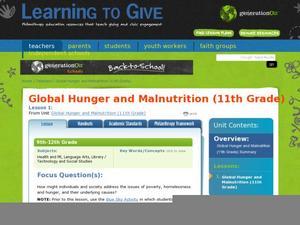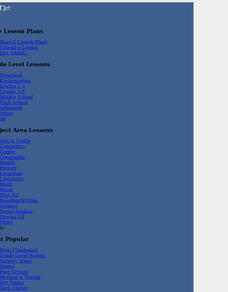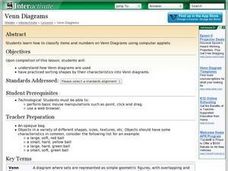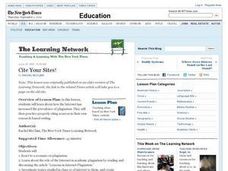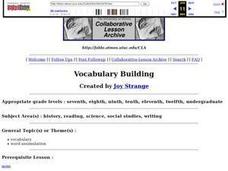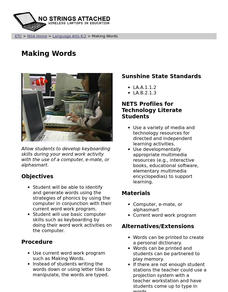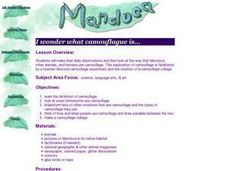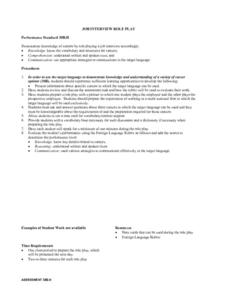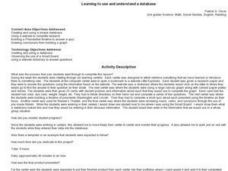Curated OER
Rooting One's Way To Meaning
Students use a thesaurus on the internet to explore the meanings of Greek and Latin roots. They find definitions of given words, draw a concept map for root words, and write four synonyms for each word. Students discover how Latin and...
Curated OER
Global Hunger and Malnutrition
Is there a difference between hunger and malnutrtion? Is this a problem only in third world countries? How does hunger and malnutrition affect the community? Why do these problems exist when the world produces enough food to feed...
Curated OER
Newsinary
Students demonstrate dictionary and vocabulary skills. They create an index card book containing a page for each letter of the alphabet that includes a word, definition, and sentence.
Curated OER
Express Yourself!
First graders work as a group to generate and play a game that displays an understanding of developmental level reading vocabulary based on a grade level checklist. This lesson plan really engages the creative side of your students!
Curated OER
Alphabetizing Vegetables
Students explore alphabetical order. In this language arts instructional activity, students are given a list of twenty vegetables and complete a worksheet putting the names of these vegetables in alphabetical order.
Curated OER
Venn Diagram Lesson Plan
Students use Venn diagrams in order to classify different objects and numbers. They then use "Venn Diagram Shape sorter" applets on the computer.
Curated OER
Cite Your Sites
What information would you find in an almanac that you would not find in an atlas? What is the difference between a dictionary and a thesaurus? Using a Cite Your Sites worksheet on which they record their observations, groups participate...
Pimsleur
Book Report: Children Return to Their Roots
Based on the book Victoria Goes to Brazil (Children Return to their Roots) by Maria de Fatima Campos, this activity will teach learners about family, geography, sports, music, and transportation. Learners read, summarize, and use the...
Curated OER
Vocabulary Building - Declaration of Independence
Young scholars read the first part of the Declaration of Independence and mark the words they don't know. First, they try to guess what the words mean by looking at the them in context, and then they look up the words in a dictionary.
Curated OER
An Illustrated Guide to the Late 1800's
Eleventh graders investigate the time of the late 1800's. They conduct research using a variety of resources that could include the internet. Students create an alphabetized encyclopedia of important historical people of the time period.
Curated OER
What's Organic?
Students discuss background information presented by the teacher and read dictionary definitions for the words "organic" and "synthetic." In this gardengin instructional activity, students complete a worksheet on the material. Students...
Curated OER
Making Words
Young writers identify and generate words using the strategies of phonics on the Making Words computer program. Words are typed instead of having to use tiles or paper. Extension activities such as playing the memory game, drawing...
Curated OER
Nym Family
List and identify words for each part of the "Nym" family: synonyms, antonyms and homonyms. Middle schoolers place words in the correct category, then find the corresponding mate in a dictionary or thesaurus.
SForsyth
Name and Describe a Street
Build creative writing skills through a project centered around a street name. Young writers start by creating a unique street name and brainstorming what life might be like on that street before writing a descriptive piece about this...
Curated OER
I Wonder What Camouflague Is...
Young scholars examine the way that Manduca, other animals, and humans use camouflage. They participate in a teacher directed camouflage experiment and the creation of a camouflage collage.
Curated OER
Reference Materials
Young scholars discuss reasons to use reference materials, identify correct reference material to use for specific information, find answers to specific questions by locating information in encyclopedia, dictionary, atlas, almanac,...
Curated OER
Community Words
Students participate in a community walk. In this communities activity, students use a digital camera to take photos during a community walk. Students take photos of store signs and street signs. Students design a poster with their...
Curated OER
Fascinating Creatures
Sixth graders explore the characteristics of mythological creatures. In this mythology lesson, 6th graders use print and Internet sources to define and classify mythological creatures, such as Centaur, Cerberus, Chimera, Cyclops,...
Curated OER
Checkmate: What is the History of Chess?
Students create a timeline. In this history of chess lesson, students use the Internet to examine the chess history timeline. Students read books on the history of chess, answer questions and create a timeline using a...
Curated OER
Job Interview Role Play
Students participate in a role play with a partner in which they practice interviewing for a job. In the scenario, they must ask or answer questions regarding three different careers in a foreign language. A great instructional activity...
Curated OER
Mice Squeak; We Speak
Students create a poster. In this vocabulary instructional activity, students use vocabulary words such as squeak, creak, squeal, squawk and quack to identify the sounds and noises of each word. Students come up with rhyming...
Curated OER
Learning to use and understand a database
Second graders were given a research paper and they were to answer the questions using the information found on the website. The website was a dictionary where the students would click on the letter to where they would go to find the...
Curated OER
Cinquain Lesson Plan
Pupils read an example of a cinquain and look for patterns. In this cinquain lesson, students repeat the process with another poem and then compare the two. Pupils will review the process and form of writing a cinquain as presented by...
Curated OER
Predicting the Meaning of Unfamiliar Words in a Text
Middle schoolers develop strategies for what to do when they come upon words in a text that they don't know. After a class discussion, pupils are given a selection of text that contains some very difficult words. They are instructed to...

